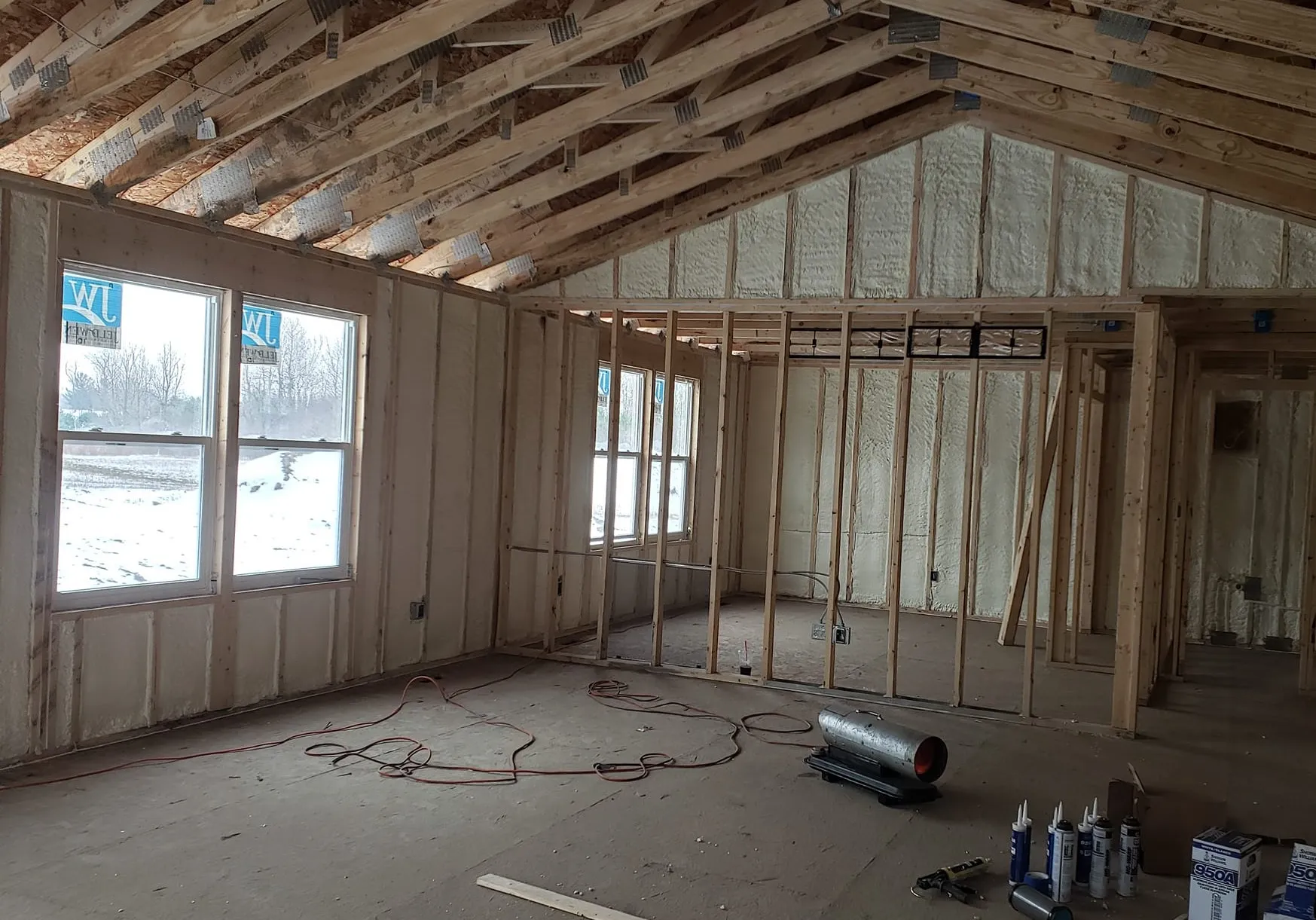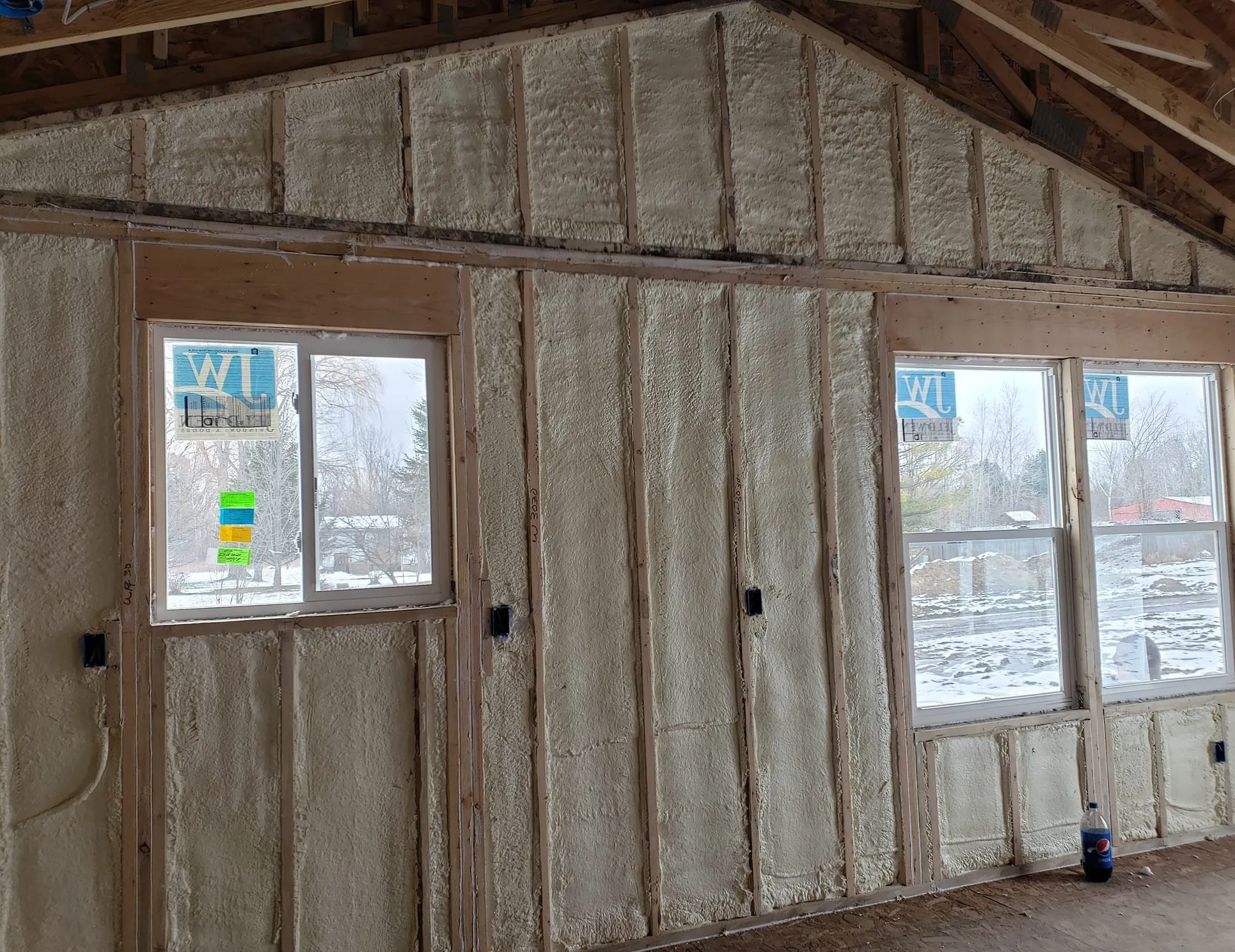
Spray foam insulation transforms Clemens homes by creating an airtight thermal barrier that reduces energy costs by 20-50% while eliminating air leaks, moisture intrusion, and temperature inconsistencies. This advanced insulation technology adheres directly to surfaces, expanding to fill gaps and cracks that traditional insulation materials cannot reach.
The decision to upgrade involves choosing between closed-cell and open-cell foam types, understanding R-value requirements for Michigan’s climate zone, and selecting qualified installation professionals who understand local building codes. Based on extensive field experience with hundreds of Clemens area installations, proper spray foam application delivers immediate comfort improvements and long-term energy savings that typically recover installation costs within 3-5 years.
Clemens homeowners face unique challenges with Michigan’s temperature extremes, ranging from sub-zero winters to humid summers. Closed-cell spray foam provides superior performance in this climate zone, offering both insulation and moisture control in a single application. This dense foam creates a vapor barrier while delivering R-6.5 to R-7 per inch of thickness.
Open-cell foam works effectively in interior applications where moisture control is less critical. This lighter-density option provides excellent sound dampening and costs approximately 30% less than closed-cell alternatives. However, it requires separate vapor barrier installation in exterior wall applications.
| Spray Foam Type | R-Value per Inch | Moisture Barrier | Best Applications |
|---|---|---|---|
| Closed-Cell | R-6.5 to R-7 | Yes | Exterior walls, basements, crawl spaces |
| Open-Cell | R-3.5 to R-4 | No | Interior walls, attics with proper ventilation |
Bonus Tip: Schedule spray foam installation during moderate weather conditions (50-80°F) for optimal curing and expansion. Extreme temperatures can affect foam performance and increase installation complexity.
Professional spray foam installation requires specialized equipment and safety protocols that exceed typical insulation projects. The process begins with thorough surface preparation, including cleaning and protecting adjacent areas from overspray. Temperature and humidity monitoring ensures optimal foam chemistry throughout application.
Experienced installers understand that Michigan’s climate requires specific foam formulations and application techniques. Winter installations demand heated workspace preparation, while summer applications require humidity control to prevent foam degradation.
Bonus Tip: Request foam samples from different batches during installation to verify consistent density and adhesion. Quality installations maintain uniform thickness and complete surface coverage without gaps or thin spots.
Installation timing significantly impacts project success and cost. Spring and fall offer optimal conditions for spray foam application, with moderate temperatures and lower humidity levels. Scheduling during peak heating or cooling seasons may result in higher labor costs and extended wait times.
Building code compliance varies by application area. Clemens follows Michigan’s residential building code, which requires thermal barriers over exposed spray foam in living spaces. Some applications may require permits and inspections, adding time and cost to the project timeline.
Health considerations include temporary occupancy restrictions during and immediately after installation. Most manufacturers recommend 24-48 hour ventilation periods before reoccupying treated spaces, particularly important for households with respiratory sensitivities.
Colony Insulation provides comprehensive insulation solutions tailored to Clemens area homes and commercial properties. Each service addresses specific thermal performance challenges while maintaining building code compliance and optimal indoor air quality.

Spray foam insulation delivers optimal performance when installed as part of a comprehensive building envelope strategy. This includes attention to windows, doors, and other potential air leak sources that can compromise overall efficiency gains.
Regular HVAC system maintenance becomes more critical in tightly sealed homes. Reduced air exchange means indoor air quality depends heavily on mechanical ventilation and filtration systems. Schedule professional HVAC evaluation within six months of spray foam installation to optimize system performance.
Climate-specific considerations for Clemens area homes include ice dam prevention and moisture management. Proper spray foam installation eliminates the thermal bridging that contributes to ice formation while providing moisture control that prevents mold and structural damage.
Bonus Tip: Document energy usage for 12 months before and after installation to quantify savings and identify additional efficiency opportunities. Smart thermostats provide detailed energy reports that demonstrate spray foam performance over time.
Quality spray foam installation requires specialized expertise and proper equipment to ensure lasting performance and safety. Professional installation includes comprehensive site evaluation, proper surface preparation, and post-installation quality verification to meet manufacturer specifications and building code requirements.
Colony Insulation brings decades of experience to every Clemens area project, combining technical expertise with local climate knowledge to deliver optimal results. Contact [email protected] or call (586) 850-1442 to schedule a comprehensive evaluation and receive detailed recommendations tailored to your specific home and efficiency goals.
Most residential applications require 1-3 days depending on coverage area and access complexity. Attic installations typically complete in one day, while whole-house projects may extend to a full week including preparation and curing time.
Closed-cell foam adheres to most existing materials, but optimal performance requires removing loose or damaged insulation first. Open-cell foam works effectively over properly installed fiberglass batts in certain applications.
Properly installed spray foam requires minimal maintenance beyond periodic visual inspection for damage or settling. Quality installations maintain performance for 20-30 years without degradation.
Energy-efficient upgrades typically increase home value by 3-5% according to National Association of Realtors data. Documented energy savings and comfort improvements appeal to environmentally conscious buyers.